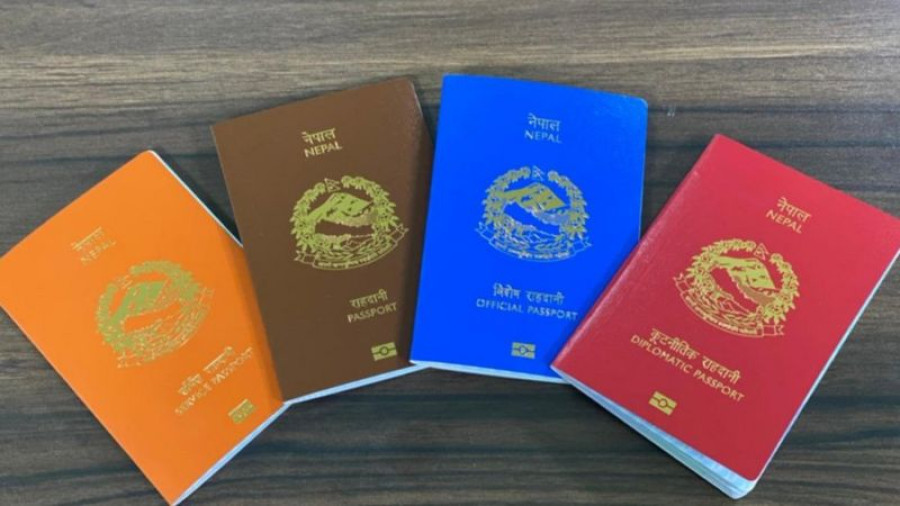National
Bidders demand fair play as passport tender drags on
Interested parties are calling for extension of submission deadline citing recent revisions to bidding conditions.
Anil Giri
The dispute over the multi-billion passport tender issued by the Department of Passports (DoP) continues as some international bidders have sought more time to submit their documents.
They have demanded the removal of provisions related to offering discounts and counter-discounts by bidders, as well as certain other controversial clauses.
Passport tenders have repeatedly been mired in controversy since 2009-10 due to the government’s failure to adapt to new challenges, vested interests, the competitive bidding process, and the adoption of new technology, among other reasons.
At a time when some bidders are calling for a transparent bidding process and a level-playing field for all participants, the DoP is under pressure from various oversight bodies, including the Commission for the Investigation of Abuse of Authority, and the Public Procurement Monitoring Office (PPMO), to address their grievances. Some bidders believe that IDEMIA, which has been printing Nepali passports since 2010, is again being given preferential treatment in the new tender process.
On Sunday, the PPMO wrote to the DoP, advising it to consider a time extension to allow more bidders to compete, according to a letter seen by the Post. Many bidders had previously asked for inclusion of a provision to allow joint ventures in the bidding process, which the DoP recently accommodated through an amendment.
Now that joint ventures have been allowed, another concern has emerged. Prospective bidders are demanding extension of the bid submission deadline. But the DoP is reluctant to do so, as further delays in awarding the contract could necessitate extra printing of passports, known as variations, which will complicate the process.
“We kindly request your consideration of this matter and respectfully ask for an extension of the bid submission deadline by an additional 45 days,” said a letter sent by UAE-based United Printing and Publishing, referring to clause 9.3 of the invitation to bids.
The government has repeatedly allowed the France-based IDEMIA to print additional passports through variation orders, according to several annual reports of the Auditor’s General Office. Now, with passport stocks depleting rapidly, the DoP is again having to make quick decisions—which in turn could again favour IDEMIA.
Complaints have been filed with several oversight agencies, including the CIAA and parliamentary committees, alleging that successive governments, through policy decisions, have unduly benefited one particular in printing and supplying millions of passport copies.
DoP officials, meanwhile, say that if the tender process is not completed on time, the government may be forced to bypass competitive bidding and directly award IDEMIA another contract to print additional passports.
The DoP has around 600,000 passports in stock, which will only meet the demand up to July, said a foreign ministry official. “If we fail to award the tender, if legal challenges arise, or if the government cancels the contract process, we will have no option than to grant IDEMIA another printing order without a tender.”
The DoP, upon the request of bidders, has amended several clauses of the bidding document, said Tirtha Raj Aryal, the director general at the DoP.
“That is fine,” said another official. “But if IDEMIA refuses to print additional passports in the event of a tender being cancelled, we will face a real crisis in and outside the country. That is why we are handling this issue very carefully.”
The DoP distributes over four to five thousand passports daily from its headquarters, 77 district administration offices, other adjunct (Ilaka) administration offices, as well as from Nepali missions abroad.
Of Rs12 billion contract, the winning bidder will need to print and supply 6.4 million passport copies.
After receiving one after another complaints, the DoP on Friday held a clarification meeting with local representatives of the international companies who are competing for the e-passport deal.
“Our tender process is progressing smoothly, and we have addressed the grievances and complaints of all interested bidders through different means,” said Aryal.
The DoP has also called a press conference on Tuesday to give updates on the tender process.
The final bid submission deadline is February 11, but some bidders have demanded additional time citing the recent changes in the bid documents.
On Friday, according to a local representative of an international bidder, the company demanded additional time to submit its bids as the bid document had changed. “We also asked that the provision of offering discount and counter discount and end-to-end solution be removed,” he said.
Only a handful of international bidders like IDEMIA, HID Global, Veridos, Thales, Mühlbauer and IN Group provide end-to-end, complete security printing solutions.
According to the DoP, the provision of discount and counter discount will benefit the state, not a particular company. Some bidders had raised the offer of discount and counter discount, supposedly to benefit IDEMIA.
This time, the DoP has split the tender package into two: one for installing the system, and another for providing passport copies.
Some bidders think the decision to split the tender has created confusion and complications.
Some of them have also filed complaints with Parliament’s State Affairs Committee. The committee chief, Ramhari Khatiwada, confirmed having received complaints from different bidders, and said that he has asked the DoP for clarifications on the bidding process.
“The government has created an artificial shortage of passports by calling for a tender to print and supply an inadequate number of passports,” said Khatiwada. “Such manipulations must stop.”
Through a policy decision, the government in 2020 had procured over 3.1 million passport copies from IDEMIA.
After the 2015 earthquakes, the government made similar policy decisions and allowed Oberthur Technologies (which was later acquired by IDEMIA) to print and supply additional passport copies.
In 2020, according to one complaint registered at the parliamentary State Affairs Committee, during variation orders, both system costs and passport printing costs were included, in violation of procurement laws.




 13.12°C Kathmandu
13.12°C Kathmandu














